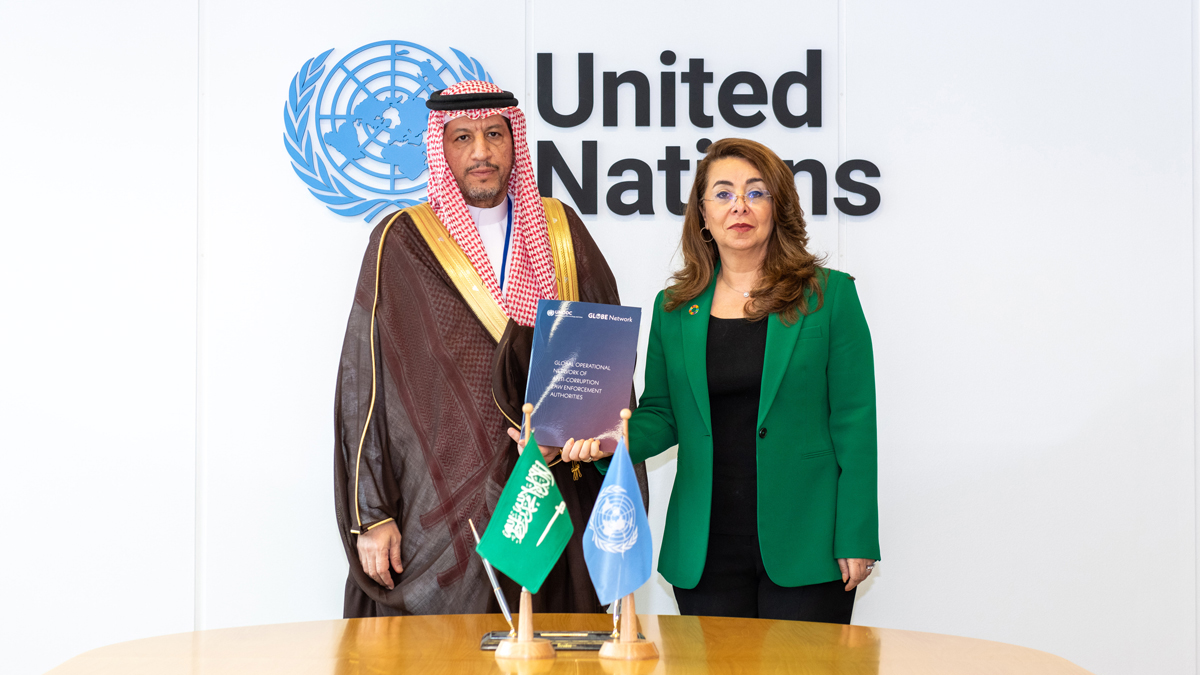
UNODC Executive Director Ghada Waly and President of Nazaha, Mazin Ibrahim Al Kahmous
Corruption cases often span multiple countries, making it essential for law enforcement authorities from different jurisdictions to work together and act swiftly. To advance transnational cases worldwide, a global and diverse community of anti-corruption practitioners, who know and trust one another and who collaborate informally and effectively, is vital. This is where the UN Office on Drugs and Crime’s (UNODC) Global Operational Network of Anti-Corruption Law Enforcement Authorities – the GlobE Network – plays a pivotal role.
The GlobE Network has grown significantly since its launch in 2021. It now brings together 206 authorities from 116 countries, fostering a trusted space for anti-corruption practitioners to connect and collaborate informally on cross-border cases and emerging challenges. The Oversight and Anti-Corruption Authority (Nazaha) of the Kingdom of Saudi Arabia has previously contributed 10 million USD for the establishment and operations of the Network.
Nazaha is now providing an additional 20 million USD for the development and maintenance of a customized secure communication platform for the Network. This funding is vital to ensuring the Network's capability to provide a safe and secure environment for practitioners to share information, and to strengthen international cooperation for anti-corruption efforts.
Exchange of information among operational anti-corruption law enforcement authorities is crucial for the successful detection, investigation and prosecution of corruption offences. Time is of the essence in this endeavor, necessitating rapid information-sharing and agile and timely responses. Informal cooperation is the cornerstone of advancing cases that, due to highly regulated and time-consuming formal cooperation processes, might otherwise face delays or obstacles.
However, informal exchange of information sometimes takes place through e-mails or unsecure messenger applications, creating a security risk and concern about whether the confidentiality of the information shared will be upheld.
Thanks to the financial support of Nazaha, the GlobE Network can get to work to deliver a cutting-edge secure communication platform that will respond to the needs of the practitioners to advance transnational corruption cases securely, more often, and at a faster pace. Ultimately, this will ensure members have the necessary tools and trust to work together efficiently in combating corruption.
UNODC Executive Director Ghada Waly met with the President of Nazaha in Vienna to sign a new agreement for the development of the communication platform.
“The GlobE Network is one of our most powerful tools for international cooperation against corruption,” said Ms. Waly. “Today, I am proud that we are taking the next step in strengthening the Network’s effectiveness with the development of a new communications platform. By facilitating direct, secure, and real-time exchange of information, this platform will streamline cross-border cooperation on anti-corruption cases. I’m grateful to the Kingdom of Saudi Arabia for its continued support to UNODC and the GlobE Network, as we strive towards a world united against corruption.”
“We thank UNODC for its continued efforts in combating all forms of corruption,” the President of Nazaha, Mazin Ibrahim Al Kahmous, said. “The signing of today’s agreement will fulfill our commitment under the Riyadh Initiative to establish a secure communication platform for anti-corruption authorities, as agreed during the Kingdom of Saudi Arabia G20 Presidency in 2020. The platform will mark a new era in facilitating international anti-corruption cooperation between countries, especially developing countries, in accordance with the United Nations Convention against Corruption.”
The Network’s members are invited to join the secure communication platform Task Force and provide funding necessary for its development and implementation.
____________________________________
Learn more about the GlobE Network: GlobE Network (unodc.org)